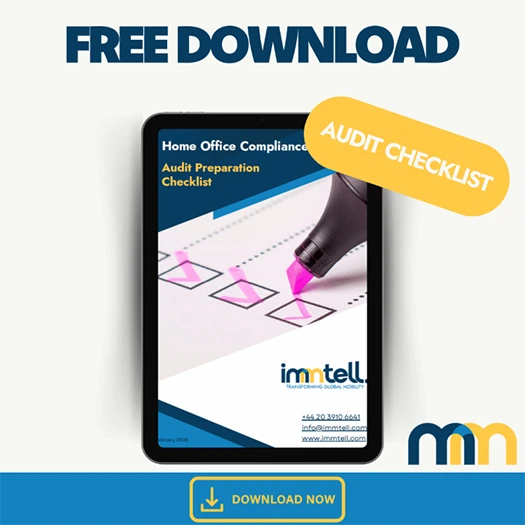Common Right to Work Check Mistakes That Could Lead to Civil Penalties
Why Right to Work Checks Matter More Than Ever in 2025

If you're responsible for hiring people in the UK, whether in HR, operations, or running the business yourself, right to work checks are probably one of those tasks you know must be done, but you rarely feel confident about. And that’s understandable.
The rules keep changing. Some staff have digital immigration status. Others bring in documents you've never seen before. You're told to check them, store them, and keep records, but rarely get proper training on what "right" really means.
Here’s the uncomfortable truth: if your business hires someone who doesn’t have the right to work in the UK, and you didn’t check properly, you could face a civil penalty of up to £60,000 per illegal worker. That’s not just a fine, it’s a reputational and operational headache that could put your business at risk.
The Financial and Reputational Risks of Getting UK Right to Work Checks Wrong
The Home Office has ramped up enforcement in 2025, particularly for employers with a Home Office sponsor licence or hiring overseas talent. But even if you're not sponsoring anyone, your duty to prevent illegal working still applies.
Civil penalties come with more than just a fine:
- Your business could be named and shamed on a public Home Office list.
- You may lose your sponsor licence if you have one.
- Future hiring could be disrupted while you’re under investigation.
- You’ll spend time dealing with audits, legal advice, and damage control. Time you can’t afford to lose.
Right to work checks are your first line of defence. But they only count if they’re done properly.
Who’s Responsible for Right to Work Checks in Your Business?
It’s easy to assume this sits with HR. However, the legal responsibility applies to the employer, not just the department. That means:
- If you’re a line manager hiring a contractor, you may be responsible.
- If you’re a director or owner, you’re ultimately liable.
- Your “statutory excuse” could fall apart if staff members do checks without training.
You can delegate the task (not to third parties) but not the risk. That’s why it’s so important to get it right consistently, across your business.
Common Mistake #1: Relying on Manual Checks Without Knowing the Current Rules
Some employees will still present passports, visas, or other documents. Others will direct you to their online immigration status by providing a share code to their eVisa.
But you can't just pick one method and apply it to everyone.
Here’s where it goes wrong:
- Employers use a manual check when a digital check was required.
- Employers don’t correctly record what was checked and when.
- The wrong documents are accepted, and the error isn’t spotted until too late.
If someone has digital status or an eVisa, you need to use the Home Office online checking service and capture a copy of the confirmation page. A manual check won't protect you.
Common Mistake #2: Accepting Expired or Incorrect Documents
You might think you’re being helpful by overlooking a small expiry date or accepting a photo on someone’s phone. But the Home Office won’t see it that way.
Documents must be:
- Original (if manual)
- Current and valid (except British or Irish passports if checking manually)
- From the approved list of acceptable documents
Outdated residence cards, expired visas, or copies don’t usually count. And just because something “looks official” doesn’t mean it’s right.

Common Mistake #3: Not Following the Digital or Statutory Excuse Process Properly
The phrase “statutory excuse” refers to your legal protection; if you’ve followed the correct UK right to work process, you can avoid penalties even if the employee turns out not to have the right to work in the UK.
But there’s a catch: you only get that protection if the check was done properly.
That means:
- If using the online service, you must do the check before the employee starts work
- You must record the date the check was done.
- You must retain a clear record, such as the PDF from the online service or a scanned copy of the documents.
Even a small administrative error, like missing a date or losing a file, can result in losing your statutory excuse.
Common Mistake #4: Overlooking Repeat Checks for Time-Limited Visas
Someone starts on a Skilled Worker visa. You complete a right to work check. All sorted?
Not quite.
If their visa has an expiry date, you're required to:
- Record and track the expiry
- Repeat the check at the correct time (usually once the visa has been extended)
This is one of the most overlooked responsibilities in sponsor licence compliance, and a common reason for Home Office penalties. Having a diary system and/or automated reminders in place can help you stay on top of it.
Even if your checks were perfect at the time, if you can't prove it later, it doesn’t count.
Your records must be:
- Legible (no fuzzy photos or screenshots)
- Securely stored
- Usually accessible for at least 2 years after the employee leaves
Paper files are risky if not backed up. And storing files across inboxes, teams chats, and shared drives makes audits a nightmare. One lost file can be a £60,000 penalty waiting to happen.
Common Mistake #7: Confusion Around EU, EEA, Swiss and Irish Citizens
Even now, years after Brexit, confusion lingers.
Here’s the quick version for NEW hires:
- Irish citizens can prove right to work with just their passport. They have the same working rights as a British citizen
- EU, EEA and Swiss citizens may need to show digital status under the EU Settlement Scheme or other visas (like a Skilled Worker visa)
- You can’t rely on an EU ID card unless it’s backed by status under a relevant scheme.
What matters isn’t nationality, it’s immigration status. That’s where the check should focus.

What the Home Office Looks for During a Compliance Visit
If the Home Office visits your site, with notice or without, they’re not just checking the last person you hired. They’ll likely review your:
- Recruitment process
- Document storage system
- Visa monitoring process
- Internal right to work policy (if you have one)
They may also ask employees how they were onboarded, or request evidence of checks from several years ago.
It’s a detailed review you need to be ready for.
The Reality of Civil Penalties in 2025: What You Could Be Facing
Civil penalties aren’t theoretical. In the last 12 months, we’ve seen small businesses, charities, and even schools fined heavily.
You could be looking at:
- Up to £60,000 per illegal worker
- Loss of a sponsor licence
- Frozen hiring while under review
- Media coverage leading to reputational damage
- Legal costs to appeal a decision
All from a check that took less than five minutes, but was done the wrong way.
How Immtell Helps You Stay Compliant Without the Stress
At Immtell, we help businesses of all sizes get this right, from fast-growing startups to long-established firms.
We offer:
- Mock immigration audits to test your process before the Home Office does
- Staff training, including a recorded course you can replay anytime
- Downloadable checklists and templates to follow the correct process
- Full support with sponsor licence compliance and visa right to work rules
Whether you need a one-off health check or a complete compliance package, we’ll guide you through it, without overcomplicating it.
Our Compliance Confidence Compass package starts from £995 + VAT and includes a remote audit, training, a risk report, and supporting materials.
Download Our Free Home Office Audit Checklist
Not ready for full support just yet? You can still take action today.
Download our free Home Office Audit Checklist and see where your business stands in under 10 minutes. It covers:
Click HERE to access the checklist instantly.
Final Thoughts: Protecting Your Business Starts With Getting This Right
Right to work checks aren’t paperwork. They’re a legal obligation, and one that’s under more scrutiny than ever before.
If you're worried something has been missed or you’ve had a few “grey area” hires, now is the time to act.
Fixing it now is far cheaper than defending it later.
If you need help, Immtell is ready to help. We’re regulated, experienced, and ready to simplify immigration compliance without hiring an entire legal team.


Unsure if your right to work checks would hold up in an audit?
Speak to Immtell today. We’ll review your process, flag the risks, and help you fix them before the Home Office gets involved.
Speak to Immtell today. We’ll review your process, flag the risks, and help you fix them before the Home Office gets involved.








